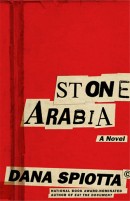 Dana Spiotta’s second novel, Eat the Document, received raves and was a finalist for the National Book Award. Her third, Stone Arabia, is attracting similar praise. It tells the story of Nik, a once-aspiring musician who meticulously chronicles a make-believe career in the pages of a voluminous journal, and his sister Denise, increasingly worried about her brother’s state of mind now that they’re in middle age.
Dana Spiotta’s second novel, Eat the Document, received raves and was a finalist for the National Book Award. Her third, Stone Arabia, is attracting similar praise. It tells the story of Nik, a once-aspiring musician who meticulously chronicles a make-believe career in the pages of a voluminous journal, and his sister Denise, increasingly worried about her brother’s state of mind now that they’re in middle age.
Kathryn Schulz says, “Instead of spending 30 years documenting a life, Nik Kranis has spent 30 years inventing one. He is a kind of single-minded, graphomanic Walter Mitty.”
David L. Ulin begins his review with a rhetorical question that lets us know how he feels about the author’s work: “Is there a more electrifying novelist working than Dana Spiotta?” He says Stone Arabia shares the concerns of her previous novels: “memory, identity, the tenuous bonds of family, the fragility of everything we hold close.”
Schulz’s enthusiasm for the novel comes across, but she considers it, finally, a mixed bag, thrilled when Nik is the focus, but less so when the spotlight moves to his sister. (“Part of the problem is that Denise feels generic, less a person than a packhorse for all the familiar baggage of modern life.”) But several reviewers have noted the brother-sister bond as one of the novel’s greatest strength.
Karen R. Long says, “Stone Arabia is a profound and moving portrayal of siblings — a rarity in adult literature. Perhaps we must go back to John Barth’s 1960 novel The Sot-Weed Factor to find a brother-sister rendering as seriously, originally fine.” William Giraldi seizes on the siblings theme through much of his review, writing, “As with [George Eliot’s] Tom and Maggie Tulliver, their brother/sister union is both sustenance and heartscourge, Denise too emotionally bedraggled to pry herself away from her self-destructive brother, and Nik too broke ever to be without his faintly more competent younger sister.”
Kate Christensen (whose endorsement on the paperback will likely read: “gritty, intelligent, mordant and deeply sad . . . a work of visceral honesty and real beauty”) compares Nik and Denise to another, more recent famous fictional family: “The siblings seem, in a sense, like the older, poorer, nonreligious, failed West Coast versions of Salinger’s Franny and Zooey, another brilliant, hermetically sealed brother-sister pair. But Salinger’s characters are young, their potential and genius still unrealized. The Kranis Chronicle is winding down, possibly finished forever, and broken without any belief in or hope for repair.”
Stone Arabia by Dana Spiotta
Scribner, 256 pp., $24.00

